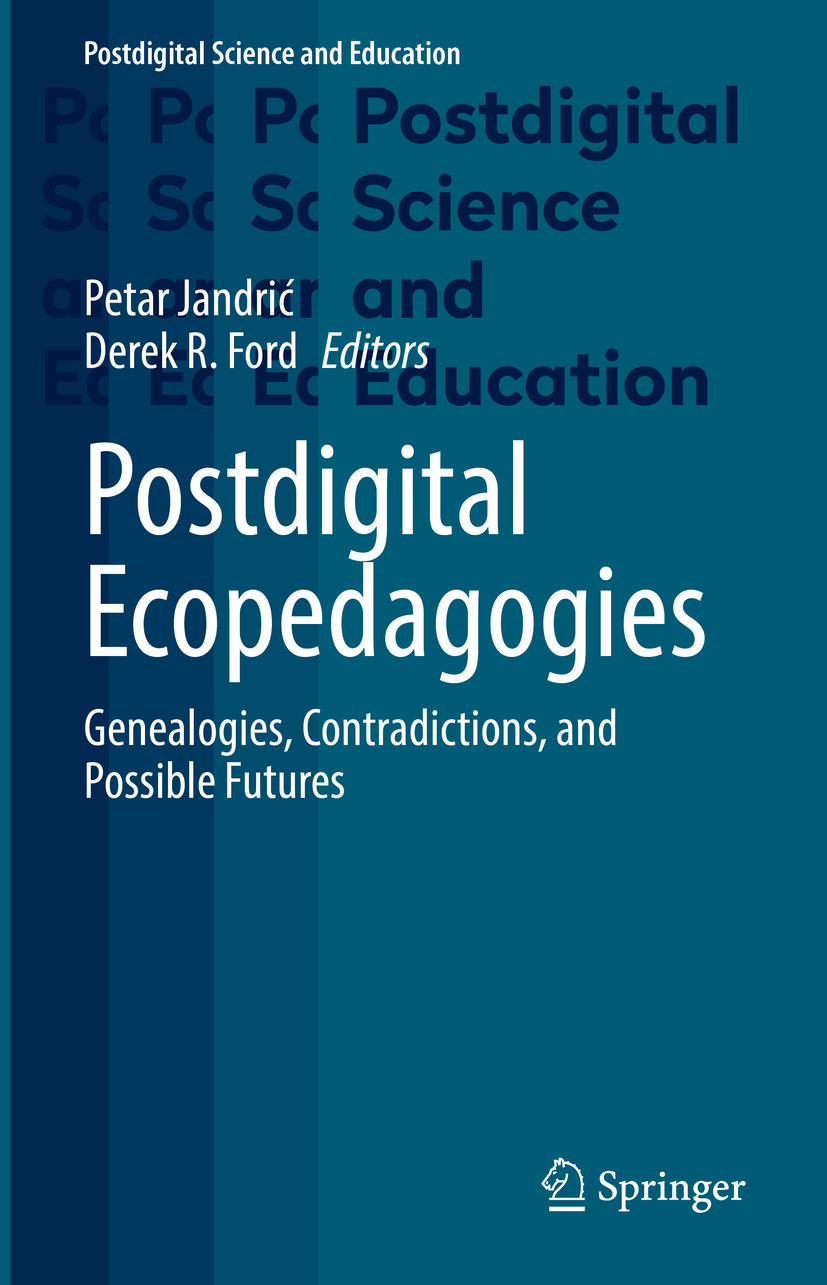Why Postdigital Ecopedagogies?
Ecopedagogy is broadly understood as a pedagogy that covers environmental themes such as climate change, abuse of the environment, or more sustainable living. Ecopedagogy is institutionalized (governmental protection agencies), independent (non-governmental sector), individual (Greta Thunberg), and collective (massive protests against pipelines, power plants, and so on). Ecopedagogy is being researched in all traditional disciplines (natural sciences, humanities, social sciences, arts, religion, and so on) and uses various multi-, inter-, and transdisciplinary approaches. Situated at the intersections between theory and practice, ecopedagogy is often linked to emancipation and social justice.
Despite these efforts, ecopedagogy still poses more questions than answers. This is complicated by the fact that our contemporary world is, in many ways, postdigital. It is no longer feasible to draw hard-and-fast lines of demarcation between the digital and analog, the virtual and material. The concept of the postdigital champions a holding-to-account of the digital that seeks to look beyond the promises of instrumental efficiencies, not to call for their end, but rather to establish a critical understanding of the very real influence of these technologies as they increasingly pervade social life.
The digital is not located in a space separate from the analog. For example, the label of ‘traditional’ or ‘face-to-face’ classrooms is irrelevant and too simplistic in nature. Digital education is not independent of the material world, as technology and education are interdependent. It is no longer useful to distinguish between digital and nondigital frameworks of learning because technology is now a driving force behind the engagement of materials within the classroom.
Postdigital Ecopedagogies: Genealogies, Contradictions, and Possible Futures
The fifth book in the Postdigital Science and Education book series, Postdigital Ecopedagogies: Genealogies, Contradictions, and Possible Futures, edited by Petar Jandrić and Derek Ford, responds to the postdigital challenge and conceptualizes ecopedagogies as forms of educational innovation and critique that emerge from, negotiate, debate, produce, resist, and/or overcome the shifting and expansive postdigital ecosystems of humans, machines, nonhuman animals, objects, stuff, and other forms of matter. Contemporary postdigital ecosystems are determined by a range of new bioinformational reconfigurations in areas including capitalism, imperialism, settler-colonialism, and ontological hierarchies more generally.
Postdigital ecopedagogies name a condition, a question, and a call for experimentation to link pedagogical research and practice to the challenges of our moment. They pose living, breathing, expanding, contracting, fluid, and spatial conditions and questions of our non-chronological present. Postdigital Ecopedagogies: Genealogies, Contradictions, and Possible Futures presents analyses of that present from a wide spectrum of disciplines, including but not limited to education studies, philosophy, politics, sociology, arts, and architecture.
The first part of Postdigital Ecopedagogies: Genealogies, Contradictions, and Possible Futures explores several of the diverse theoretical faces and potential trajectories of postdigital ecopedagogies in order to map out a partial constellation of the educational and intellectual coordinates of postdigital ecopedagogies. Chapters in the second part of the book present a wide range of anti-imperialist, anti-colonial, and decolonial praxes across the globe, from Italian Critical and Marxist Theory and Freirean pedagogies to Pan-Africanism, Communism, and Indigenous theories and practices. Chapters in the final section of the book bring a range of aesthetic practices to bear on postdigital ecopedagogies.
The Many Faces of Postdigital Ecopedagogies
Postdigital ecopedagogies have many faces. These faces sometimes align with each other, sometimes fulfil, and expand each other, and sometimes present straightforward Janus-like contradictions. This multifacetedness is one of the key difficulties in working with postdigital ecopedagogies, and also one of their biggest advantages over more coherent theories.
In the words of the Rastafarian movement, postdigital ecopedagogies are not aimed at replacing our rigid capitalist Babylon with another, perhaps more left-oriented but nevertheless just as constrictive Babylon. Postdigital Ecopedagogies: Genealogies, Contradictions, and Possible Futures clearly shows that we need to challenge the very concept of the Babylon and allow, in the words of Chairman Mao Zedong, ‘a hundred flowers blossom and a hundred schools of thought contend.’




